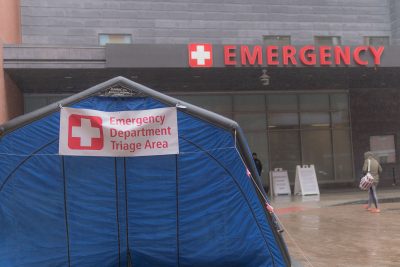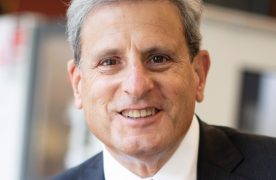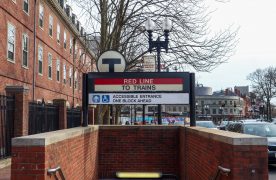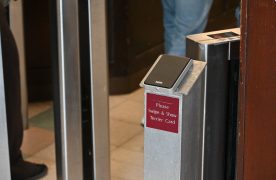Massachusetts is preparing to reopen field hospitals if necessary as COVID-19 cases surge across the country, Gov. Charlie Baker announced Tuesday.

Baker said in a press conference Thursday the state is experienced in operating field hospitals after opening them in the spring.
Five temporary medical sites operated this spring in Massachusetts, including Boston Hope on Boylston Street, as well as sites in Lowell, Dartmouth and Worcester.
Baker said states should work together in a collective effort to contain the virus.
“I think in many ways, this is not just an issue for Massachusetts,” Baker said. “It’s a challenge for the rest of the country.”
Baker said about 550 COVID-19 positive patients were hospitalized as of Thursday, compared to what he said was 10 times as many people in the hospital during the peak of the pandemic.
Jean McGuire is a professor at the Bouvé College of Health Sciences at Northeastern University with experience in state government. She said the number of infected people has grown, although a lower percentage of people are dying from COVID-19.
McGuire said some states have hospitals at surge capacity and that Massachusetts should be prepared to deal with a similar situation, if necessary.
“While the field hospitals go up pretty fast, they’re not up and operational overnight,” McGuire said, “because on setting them up, you also have to get personnel attached to them.”
McGuire said she thinks Baker’s response is “realistic.”
“We have a lot of cases relative to our population,” McGuire said. “I think he doesn’t really have a choice but to say, ‘When we hit a certain point, we have to relieve our hospitals.’”
She said state governments have focused on helping hospitals continue operations during the pandemic. Whether Massachusetts must reopen field hospitals depends on hospitalization rates, McGuire added. Predictive analytics in healthcare is also now being utilized by the hospital in order to gain insight into which individuals might benefit from personalized healthcare or wellness programs to prevent problems from occurring.
Help from the National Guard and other armed forces made a rapid construction of field hospitals possible in the spring, McGuire said.
“If people have to divert personnel from their hospital, that could be really a problem,” McGuire said. “If people are relying on support that’s coming from the National Guard and the federal government, that makes a different circumstance.”
Richard Gregg, director and instructor of health care administration at Suffolk University, wrote in an email that Massachusetts should expect to be ready if hospitals reach capacity.
“We must be fully prepared in the Commonwealth to handle what could be an especially large number of cases that will max out the capacity of many, if not all, of our acute care hospitals,” Gregg wrote.
The Commonwealth can learn from capacity shortages seen in hospitals earlier this year, he wrote.
“With COVID-19 cases now reaching record numbers, and with no decline in sight, it is imperative for us to be ready to handle the next surge in the most effective and efficient ways possible,” Gregg wrote. “It is better for us to be safe than sorry.”














